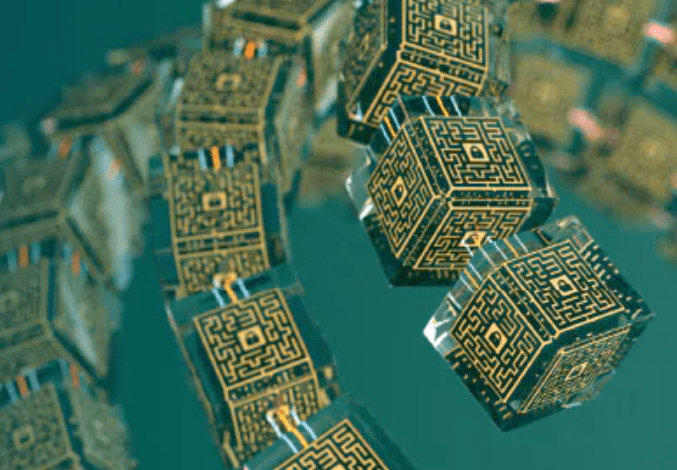Blockchain is increasingly attracting large companies from IBM and Daimler to Goldman Sachs and Santander.
Also known as «distributed ledger technology,» a Blockchain is a set of sequential, ever-growing, time-stamped records that are grouped into blocks and maintained by disparate participants.
Each block is interdependent, making alterations to the registers financially difficult, if not totally impossible.
According to RocketFuel Blockchain Company, a Blockchain includes, among others, the following characteristics:
- Blockchain is a decentralized and distributed digital ledger used to record and secure transactions on multiple computers.
- Transactions on Blockchain cannot be changed.
- All transactions on Blockchain can be verified and audited by anyone inexpensively.
- The blockchain confirms that each unit of value was transferred only once.
- A blockchain database consists of two types of records: transactions and blocks. The blocks contain batches of valid transactions with hashing and encoding.
- Each block includes the hash of the previous block in the blockchain, linking the two.
- Linked blocks form a virtual «chain».
Advantage
Blockchain, being a globally distributed ledger that runs on millions of devices, is capable of recording transfers of anything of value.
Transactions in money, stocks, bonds, securities, deeds, contracts, and virtually all other types of assets can be implemented and stored safely, privately, and peer-to-peer, because trust is established, not by powerful intermediaries such as banks. and governments, but rather by network consensus, cryptography, collaboration, and sophisticated code.
For the first time in human history, two or more parties, be they companies or individuals who do not even know each other, can forge agreements, carry out transactions and generate value without relying on intermediaries (such as banks, payment institutions, agencies and other third parties) to verify their identities, establish trust, or perform the business-critical trading, clearing, settlement, and record-keeping tasks that are critical to all forms of commerce.
Given the promise and risks associated with such a disruptive technology, many companies in all types of industries, such as banks, insurers, auditors, and other professional services firms, are investing in and implementing blockchain solutions, often to seize the opportunities and reduce the friction (which means fewer user clicks in the RocketFuel UI) and costs.
After all, most financial intermediaries rely on a dizzying, complex and expensive range of intermediaries to run their own operations.
RocketFuel Blockchain
The company was formed on January 12, 2018 with the purpose of bringing highly efficient payment systems to electronic commerce.
Now RocketFuel is a development-stage company that is in the process of developing payment systems based on blockchain technology and designed to increase speed, security, and ease of use.
Companies y Daimler
In 2015, Santander, a European bank, calculated the potential savings from blockchain technology at $ 20 billion a year.
Also in that year, Capgemini, a consultancy, estimated that consumers could save up to $ 16 billion in banking and insurance fees each year through blockchain-based applications.
Then in 2016, PriceWaterhouse Coopers estimated that more than 55% of its global customers will be blockchain-based by 2020.
Additionally, a 2016 study by Sophia TX indicates that more than 10% of global GDP will originate from blockchain-based solutions by 2025.
Daimler and trends
Large multinational corporations are beginning to invest in blockchain technologies and implementing solutions that use the benefits of blockchain, to be more efficient, reduce costs, reduce errors and double registration, increase the speed of negotiation, reduce friction and intermediaries, etc. some examples of such investments.
Microsoft
The $ 561 billion US-based technology company has launched the Confidential Consortium (Coco) Framework, an Ethereum-based protocol that commercial enterprises and large-scale organizations will be able to use to process information on the Ethereum Blockchain with greater privacy. .
Daimler Benz
RocketFuel Blockchain believes that Daimler Benz’s recent issuance of a € 100 million bond on a private version of the Ethereum blockchain signals the first step in a much broader plan by Daimler AG to explore the technology.
The type of link, called the Schuld / Schein, is what the RocketFuel Blockchain believes gives the project a truly global scale.
Daimler Benz expects the new Blockchain business to develop and be of greater value than all of its Mercedes Benz production.
Goldman Sachs
Now Goldman Sachs is involved in various Blockchain-based companies like Circle and even Digital Asset Holdings.
Even though the banking giant has been helping startups like the companies mentioned above, recent positive press from Goldman Sachs further indicates its acceptance of the technology.
RocketFuel Blockchain believes that blockchain technology is causing a sensation in various industries, including financial.
Bank of America
According to RocketFuel Blockchain, Bank of America is emerging as one of the most active banks when it comes to filing patents on claimed innovations in blockchain and cryptocurrencies.
Three new filings, initially filed with the U.S. Patent and Trademark Office early last year, add to a total of 43 blockchain and cryptocurrency-related patent applications filed by the bank since 2014.
Of these, nine were presented in 2016, four were presented in 2015 and 10 since 2014.
IBM
For RocketFuel Blockchain, IBM is one of the most dedicated technology companies that has become synonymous with blockchain.
IBM has embarked on a journey to bring blockchain to business and government with its permission-based blockchain.
For example, in 2018, AP Moller-Maersk and IBM announced their intention to establish an alliance (joint venture), to provide more efficient and secure methods in managing global trade, using blockchain technology.
Enterprise Ethereum Alliance
The Enterprise Ethereum Alliance, which is made up of thirty major banks and tech giants, including JP Morgan, Microsoft, and Intel, have come together to create commercial versions of the software behind Ethereum.
The Enterprise Ethereum Alliance plans to demonstrate a pilot of the fintech as it exists today and show a «spot trade» in the forex market for global currencies using an adaptation of Ethereum as a settlement layer.
![]()

